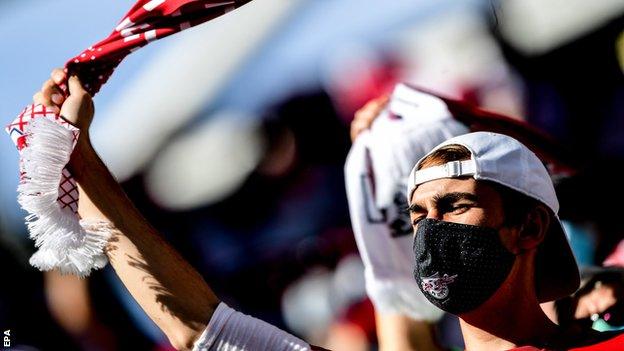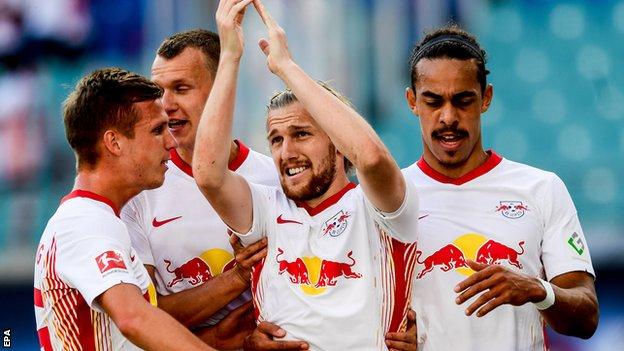Bundesliga: Fans return to stadiums - how did it go?
Last updated on .From the section European Football

Since the beginning of the coronavirus pandemic, the Bundesliga has made headlines for how it has managed a difficult, unprecedented situation.
Germany's top flight was among the first to return from the induced break and, this weekend, it was among a select few leagues on the continent to bring fans back to stadiums.
Six out of the nine host teams were allowed to welcome supporters on the first matchday of the season, with the number of spectators ranging from 4,600 to 9,300, filling 10 to 25% of the stadium seats.
Permission was granted by the local health offices that have managed the pandemic in Germany since March, with RB Leipzig one of the first clubs to reach an agreement with the authorities.
Last season's Champions League semi-finalists beat Mainz 3-1 on Sunday - and here's what it was like to be inside the stadium to see it.
Only home fans present
Leipzig were allowed to give out 8,500 tickets through a lottery open to season-ticket holders.
Most of the blue and turquoise seats of the Red Bull Arena, which has a capacity of 44,146, remained empty but there was a buzz in the stands.
The lucky ones who won a ticket seemed happy and full of energy when they poured through the stadium gates, wearing their protective masks as demanded by the club.
"It was the best experience for me and many others to finally be back in the stadium, to hear our anthem and, of course, the victory song," said Tony, who started visiting Leipzig's matches back when the team were still playing in Germany's second division. He was happy that he could meet with other supporters again and drink a beer after the game.
Once the match kicked off, Tony and the 8,500 made as much noise as possible, clapping, stomping and shouting relentlessly. Everything was stacked against Mainz, who did not bring any of their supporters with them due to one of the requirements of health authorities, as only locals were able to get tickets.
Julian Nagelsmann's side quickly turned the match into a one-sided affair. When Swedish winger Emil Forsberg scored from the penalty spot in the early stages he made sure to greet the fans first before hugging his team-mates.
Gone are those awkward moments when players were running towards stands and cheering without anyone there to respond to them.

Stadium divided into 15 sections
In the days before the match, RB Leipzig released a rulebook for every spectator to follow. As well as standard advice on hygiene and physical distancing, the club thoroughly explained its safety regulations.
The stadium was divided into 15 sections, with each one hosting about 600 fans. Up to six people were allowed to sit next to each other. Five or so seats and at least two rows were empty between these groups to ensure physical distancing.
Spectators showed a remarkable discipline. "I thought the requirement to wear a mask in your seat was excessive," Tony said. "But no-one complained."
That the hosts would beat Mainz was never really in doubt. With Leipzig 3-1 up early in the second half, fans had plenty of time to make it to the concession stands, which had to close 15 minutes before the final whistle thanks to another of the dozen or so rules.
While Forsberg and his team-mates confidently passed the ball to each other, stadium announcer Tim Thoelke informed the spectators they should wait for a couple of minutes after the match, so that those close to the exits could leave first.
Tony noticed that the departure was less organised than the arrival. Every ticket holder had to arrive within a specific time window before the match to get to their seat, but it was up to the spectators to leave safely and in an orderly manner.
As a few hundred were still waiting 10 minutes after the match, Leipzig's players marched through the arena and applauded those whose support was missing for months. In a way, it might have also been a thank you to them for being disciplined and co-operative.
Throughout the Bundesliga, fans were praised for how they adhered to the rules, knowing that this could be the beginning of a path back to normality.






















